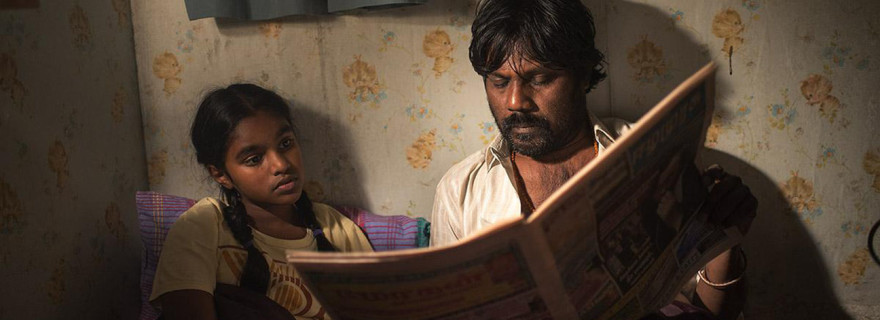'Dheepan'
Movie Rating:
3
Jacques Audiard’s 2009 feature ‘A Prophet‘ struck a perfect balance between his art house and grindhouse influences. The film mixed subtle drama and political issues with lurid genre thrills and breakneck explosions of violence. Ever since, Audiard has struggled to recapture that balance. He likely comes closest in ‘Dheepan’, which won the Palm d’Or at Cannes last year.
The film desperately wants to be a contemporary ‘Taxi Driver’ pulled from the challenging refugee experience. It toys with controversial contemporary themes and slowly builds up character through delicately balanced social realism. That all works well, but when it’s time for violent insanity to wrap the story up in a bloody climax, the whole thing falls apart. It’s easy to see what Audiard was going for and admire how close he came to accomplishing his goals, but something about ‘Dheepan’ just doesn’t quite click as a whole.
The film opens in a battered camp in Sri Lanka, where we meet the title character Dheepan (Jesuthasan Antonythasan), a former Tamil soldier seeking escape after finding himself on the losing side of a war. He soon partners up with a woman named Yalini (Kalieaswari Srinivasan) who finds an orphan girl (Claudine Vinasithamby) so that the three strangers can pose as a family and seek refugee status in France. Once there, the unlikely family find themselves living in a dilapidated housing estate somewhere outside of Paris. Dheepan takes a job as a caretaker and the young girl joins the local school. They desperately try to mix into the community despite not speaking a word of French and barely even knowing each other. Audiard’s restless handheld cameras follow the lost trio as they both struggle to form something resembling a family and maintain a lie with everyone around him.
During this portion of the film, Audiard strikes a heartbreaking, almost Ken Loach-style naturalism that’s deeply moving. The performances by the three primary non-actors are achingly real and filled with such pain that they can be difficult to watch. The drama never feels manufactured; it plays more like documentary than fiction. There’s a great deal of bickering, but not in a forced way to needlessly heighten scenes. It’s an unlikely story rarely told and a distressingly moving portrait of a particularly challenging form of the immigrant experience. It’s fresh and vital and real.
Unfortunately, it’s also not the type of story that Jacques Audiard likes to tell. From the beginning of his career, he’s been cranking out tough guy antihero tales inspired by the troubled leads of American films from the 1970s by folks like James Tobak, Paul Schrader, and of course Martin Scorsese. ‘Dheepan’ is destined to head in that direction whether it suits what came before or not.
At a certain point, Yalini takes a job as a cook and caretaker for an elderly invalid in the housing estate. He turns out to be the uncle of the local crime lord, who’s conveniently released from prison shortly after she accepts the position. Upon that bad boy’s return, a fresh drug war kicks off in the community, which unbalances Dheepan’s fragile mind. He starts experiencing flashbacks to his old wartime days and the movie draws uncomfortable comparisons between the Sri Lankan Civil War and Paris street crimes. Dheepan soon breaks down and goes ‘Death Wish’ on everyone. Like ‘Taxi Driver’, the story is coated in a woozy ambiguity that suggests it might all be a psychotic break or fantasy, but that doesn’t help the awkward transition. Audiard’s shift from subtle social realism into genre movie theatrics feels awkward and inappropriate. It doesn’t spoil all the good material that came before and is even well executed in isolation, but that gearshift still dampens things considerably.
There’s a chance that ‘Dheepan’ will play better on repeated viewings when the third act’s descent into bullet-strewn madness doesn’t feel like such an awkward transition. It’s possible, yet unlikely. The dragon of ‘A Prophet’ that Audiard continues to chase is a tough one to catch. Making a vicious crime thriller that doubles as politically conscious social realism is a nearly impossible trick to pull off, and when done incorrectly, it feels like two opposing cinematic sensibilities awkwardly slammed together. It’s hard to imagine that many audiences will appreciate the subtle character drama of the first 90 minutes and the psychotic bloodbath of the last half hour equally. Most viewers will enjoy one element while being bored by the other.
Still, the experiment is admirable and ‘Dheepan’ is filled with so many rich sequences and moving performances that it’s impossible to dismiss outright. A perfect movie this is not, but it’s most certainly an intriguing one.



